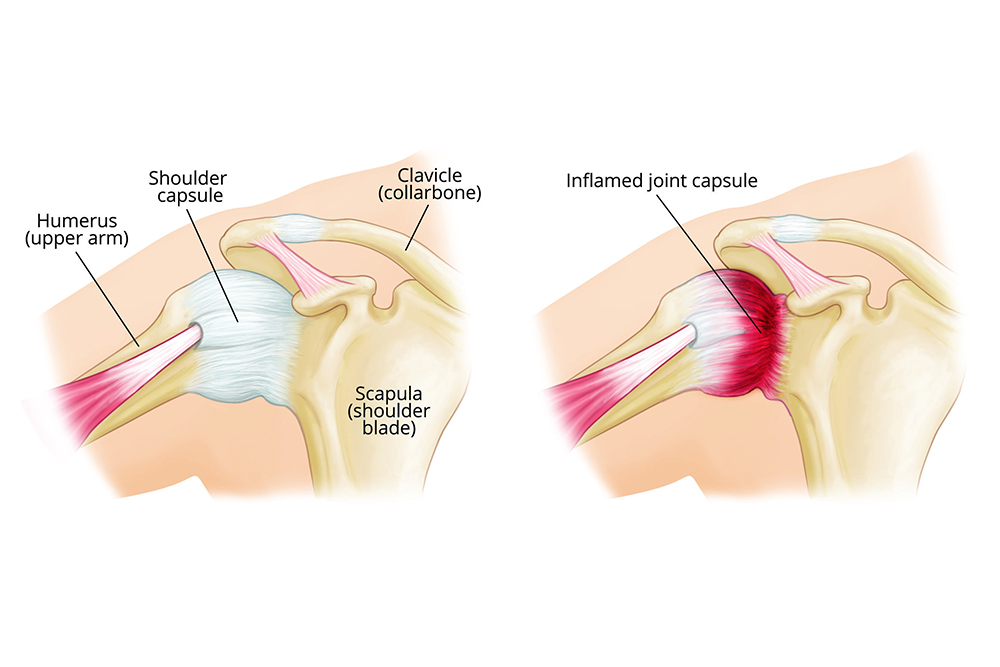Frozen Shoulder and Physiotherapy
Frozen shoulder and physiotherapy are closely related. Hyperextension of the shoulder joint causes pain and stiffness, and the term “frozen” refers to sticky, stiff tissue in the joint capsule. A frozen shoulder often follows trauma to the joint capsule, such as surgery or injury. Patients with frozen shoulders may feel instability at night when getting out of bed. There are two types of frozen shoulder: primary and secondary. Primary frozen shoulder is caused by inflammation that disrupts normal shoulder function.
In an academic tone:
Frozen shoulder typically affects people over 50, though it can occur at any age. Injuries or surgeries to the shoulder joint can trigger the condition. Timely treatment is important to prevent symptoms from worsening and limiting daily activities like lifting or playing sports.
If you have a frozen shoulder, then it’s important for you to get treatment as soon as possible so that your symptoms don’t worsen over time and prevent you from doing activities like lifting weights or playing sports with friends or family members
What Is the Main Cause of Frozen Shoulder?
Frozen shoulder results from hyperextension of the shoulder joint, leading to pain and stiffness. It can stem from injury, surgery, or inflammation. Symptoms include:
- Pain at night
- Difficulty using armrests on airplanes
- Stiffness in the upper arm and neck area
What Are the First Signs of a Frozen Shoulder?
The first signs include pain in the shoulder, particularly when moving or lifting the arm. Turning or rotating the shoulder can also be painful. Symptoms vary; some experience only mild discomfort, while others face severe pain, making even small tasks difficult.
What Are the 3 Stages of Frozen Shoulder?
Frozen shoulder progresses through three stages: Acute Frozen Shoulder, followed by Stage 2 and Stage 3. Each stage involves increasing pain and restricted motion in the shoulder. It’s important to assess pain levels at each stage to track recovery progress and seek medical attention when necessary.
Is Frozen Shoulder Serious?
Yes, a frozen shoulder is a serious condition that can cause pain and limit movement. If untreated, it can lead to permanent loss of shoulder function. Treatment aims to reduce inflammation, improve blood flow, and alleviate pain during motion exercises. In some cases, surgery may be required.
What Is the Best Exercise for Frozen Shoulder?
Several exercises help ease frozen shoulder discomfort. Foam rolling is effective, especially with a tennis or lacrosse ball. Rolling helps increase circulation and relieve muscle spasms. TheraCane or TheraBands can also help improve the range of motion, though they should be used cautiously to avoid aggravating the pain.
How Do You Test for a Frozen Shoulder?
To test for a frozen shoulder, check for pain and stiffness and assess your range of motion. Tenderness or swelling at the shoulder joint might indicate an issue. Physical examinations and tests by a healthcare professional are necessary for an accurate diagnosis.
The Frozen Shoulder Mechanism
A frozen shoulder occurs when trauma, such as surgery or injury, damages the joint capsule. This can be due to accidents, falls, or sports-related injuries. Physical therapy and cortisone injections are common treatments for the condition.
Nighttime Instability
Frozen shoulder patients often feel instability at night when getting out of bed. Dyskinesia, which refers to pain, stiffness, and restricted motion, is a common symptom. Swimming stroke therapy is one of the best exercises for improving shoulder flexibility and strength.
Types of Frozen Shoulder
Frozen shoulder comes in two forms: primary and secondary. Primary frozen shoulder arises from inflammation that disrupts blood flow to shoulder muscles, causing pain and stiffness. A secondary frozen shoulder results from an injury or surgery, affecting normal shoulder movement.
How Long Does It Take for Frozen Shoulder Symptoms to Appear?
Symptoms of a secondary frozen shoulder can take up to six months to develop. If you suspect a frozen shoulder, consult a doctor immediately. Early intervention can help prevent long-term damage.
Treatment and Prevention
Frozen shoulder can be treated with medication and physical therapy, especially if diagnosed early. Nighttime symptoms tend to worsen because of pressure on the injured shoulder during sleep. Swelling, stiffness, and pain are common, but prompt treatment can prevent the condition from becoming chronic.
Conclusion
A frozen shoulder is a painful condition that affects the shoulder joint’s range of motion. If you experience symptoms such as stiffness, pain, or limited mobility, consult a doctor promptly for treatment and recovery.

